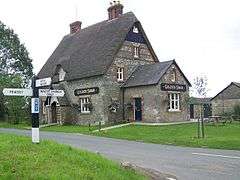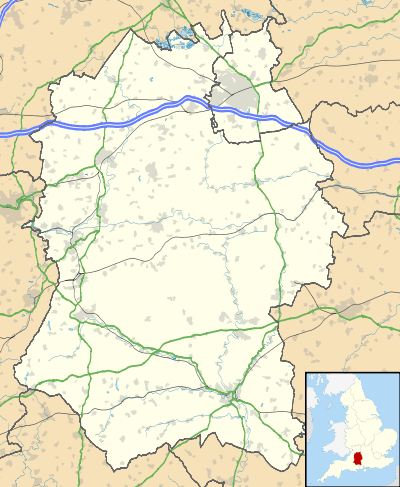Wilcot
Wilcot is a village and civil parish in Wiltshire, England, in the Vale of Pewsey about 1.5 miles (2.4 km) northwest of Pewsey. The parish includes the village of Oare and the hamlets of Draycot Fitz Payne, Rainscombe, West Stowell and Wilcot Green.[2]
| Wilcot | |
|---|---|
 The Golden Swan, Wilcot | |
 Wilcot Location within Wiltshire | |
| Population | 558 (2011 census)[1] |
| OS grid reference | SU140608 |
| Civil parish |
|
| Unitary authority | |
| Ceremonial county | |
| Region | |
| Country | England |
| Sovereign state | United Kingdom |
| Post town | PEWSEY |
| Postcode district | SN9 |
| Dialling code | 01672 |
| Police | Wiltshire |
| Fire | Dorset and Wiltshire |
| Ambulance | South Western |
| UK Parliament | |
| Website | Parish Council |
History
Roman coins were found in 2000 at the site of Stanchester villa. Wilcot and Draycot were recorded in the Domesday Book of 1086.[3]
The parish was described as follows in The National Gazetteer (1868):
WILCOT, a parish in the hundred of Swanborough, county Wilts, 6 miles S.W. of Marlborough, 10 E. of Devizes, and 1½ mile N.W. of Pewsey. The village is situated close to the Avon and Kennet canal. There are about 200 acres of open downs. The soil is generally a rich loam, and the land chiefly arable. The parish includes the tythings of Draycott-Foliat, Care, and Stowell, or Towel. At the time of the Norman survey it had a church, vineyard, and seat of Edward de Salisbury, and subsequently came to the Lovells, by whom it was held till the reign of Henry VII. There are several chalk pits. The living is a vicarage in the diocese of Salisbury, value £150. The church is dedicated to the Holy Cross. Colonel Wroughton is lord of the manor.[4]
As noted by the Gazetteer, at the time of the Domesday Book Wilcot was one of the manors of Edward of Salisbury, who was High Sheriff of Wiltshire from 1070 to 1105 and had a "very good house" there.[5]
There is a 17th-century legend that Wilcot Vicarage was haunted by the incessant sound of a tolling bell. It is said that a wizard caused the tolling at a request of a drunkard, who wanted to revenge himself on the vicar for refusing to ring his bells late at night.[6]
A village at East Stowell was deserted in the early 19th century.[7]
Local government
Wilcot parish elects a joint parish council with the smaller neighbouring parish of Huish. The full name of the council is 'Wilcot and Huish (with Oare)'.[8] It falls within the area of the Wiltshire Council unitary authority, which is responsible for all significant local government functions.
Rainscombe was transferred from North Newnton parish in 1885.[9]
Notable buildings
The Church of England parish church of the Holy Cross is Grade II* listed.[10] It has 13th-century origins but was restored after a fire in 1876.[11]
The Manor House, 17th century with later additions, is also Grade II* listed.[12]
Amenities
The village has a pub, the Golden Swan.[13]
The Kennet and Avon Canal passes close to Wilcot.
A school was built at Wilcot Green in 1841 and closed in 1969; the nearest primary school is at Oare.[14]
References
- "Parish population 2011". Office for National Statistics. Retrieved 15 March 2015.
- "Wilcot". Wiltshire Community History. Wiltshire Council. Retrieved 18 July 2015.
- Wilcot in the Domesday Book
- WILCOT, Wiltshire at genuki.org.uk, accessed 20 August 2011
- Judith A. Green, The Aristocracy of Norman England (2002), p. 62
- Ash, Russell (1973). Folklore, Myths and Legends of Britain. Reader's Digest Association Limited. p. 188. ISBN 9780340165973.
- "Victoria County History - Wiltshire - Vol 10 pp190-204 - Parishes: Wilcot". British History Online. University of London. Retrieved 18 July 2015.
- "Standing Orders" (PDF). Wilcot and Huish (with Oare) Parish Council. Retrieved 15 February 2015.
- "Parishes: North Newnton". A History of the County of Wiltshire. 10. Victoria County History. pp. 126–136. Retrieved 24 August 2019 – via British History Online, University of London.
- Historic England. "Church of the Holy Cross, Wilcot (1364663)". National Heritage List for England. Retrieved 18 July 2015.
- "Church of the Holy Cross, Wilcot". Wiltshire Community History. Wiltshire Council. Retrieved 18 July 2015.
- Historic England. "Wilcot Manor House (1364664)". National Heritage List for England. Retrieved 18 July 2015.
- "The Golden Swan, Wilcot". Retrieved 18 July 2015.
- "Wilcot Church of England School". Wiltshire Community History. Wiltshire Council. Retrieved 18 July 2015.
Further reading
- Crittall, Elizabeth (ed.); Baggs, A. P.; Crowley, D. A.; Pugh, Ralph B.; Stevenson, Janet H.; Tomlinson, Margaret (1975). Victoria County History: A History of the County of Wiltshire, Volume 10: Swanborough hundred; the borough of Devizes.CS1 maint: extra text: authors list (link)
External links
| Wikimedia Commons has media related to Wilcot. |
- "Wilcot and Huish with Oare parish website". Retrieved 28 February 2014.